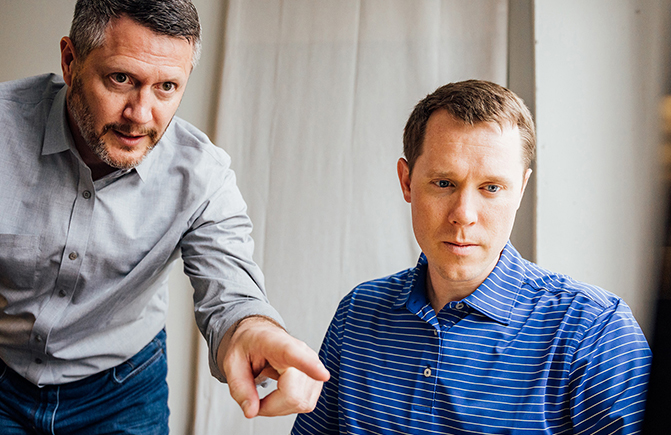The question
How do you make up for lost expertise?
It’s no secret workforce turnover in utility accounting departments is a growing concern in our industry over the past several years. The departure of experienced professionals, coupled with ongoing attrition, has resulted in a significant loss of institutional knowledge within departments.
The unique challenges of the Utility Accounting space require professionals several years’ time to become proficient in their work. However, when the average experience level and tenure are low, it is difficult to on-board new staff and make them productive quickly. Over time, these issues turn into a downward spiral that widens the knowledge gap in a department to critical levels. As of yet, our industry hasn’t found a compelling way to overcome the worrying trend.

Answer with Apprenticeship
Add a team of business and technical subject matter experts to transfer invaluable knowledge to newer team members and equip senior team members with tools, processes, and documentation.
The STAKES
Unchecked knowledge gaps are a risky proposition

Compliance and Regulatory Issues
The complex regulatory environment of Utility finance heightens the risks to incur penalties, tax normalization violations, legal consequences, and a damaged reputation.

Operational Inefficiencies
A team without sufficient knowledge will struggle to perform its tasks accurately and efficiently, leading to errors, delays, and rework that cripple critical financial reporting, tax filings, and decision-making processes.

Reduced Internal Stakeholder Satisfaction
Timelines and accuracy are essential in accounting and tax functions. Without the necessary expertise, trust is eroded across internal customers such as Regulatory, Operations, and Audit.

Loss of Institutional Knowledge
As experienced employees retire or leave the organization, their expertise is lost, hindering innovation, decision-making, and the team’s ability to adapt to evolving industry trends and regulations.

Increased Training and Onboarding Costs
The nature of constant turnover and attrition keeps teams on the back foot to best equip and ramp up new hires. Costs for recruiting and training add up quickly.
Why Classroom Training falls short
The SME immersion approach offers several advantages over traditional classroom training when it comes to addressing the knowledge loss challenge. Here’s a look at how the two approaches compare in key categories:
Contextual Relevance
Classroom Training
Often provides theoretical knowledge that may not directly align with the specific priorities, challenges and processes within a unique Utility department.
SME Immersion
Allows our consultants to work closely with your teams, gaining firsthand knowledge of your department’s unique requirements, state regulations, pain-points and systems.
On-the-Job Learning
Classroom Training
Typically focuses on theoretical concepts and may not fully prepare employees for real-world scenarios.
SME Immersion
Facilitates on-the-job learning, where our consultants actively engage with your team members, working alongside them on actual projects.
Knowledge Transfer and Mentoring
Classroom Training
Often lacks the personal interaction and mentorship that can be crucial for knowledge transfer.
SME Immersion
Offers a mentorship component, where our consultants provide one-on-one guidance, share their expertise, and transfer tacit knowledge accumulated through years of experience.
Collaboration and Knowledge Sharing
Classroom Training
Typically a one-way information flow from the instructor to the participants.
SME Immersion
Offers a mentorship component, where our consultants provide one-on-one guidance, share their expertise, and transfer tacit knowledge accumulated through years of experience.
Long-Term Recommendations
Classroom Training
Often focused on immediate skill acquisition, but may not address long-term knowledge retention needs.
SME Immersion
Goes beyond training by providing bi-monthly reports with detailed recommendations. These recommendations outline areas that require attention and suggest projects or initiatives that can be gradually implemented over time to address knowledge gaps.
Plug the Knowledge Leak

SME Immersion offers numerous benefits that address the core challenges your organization is facing.
RCC Provides:
We leverage the expertise of our consultants and their deep understanding of the accounting and tax requirements specific to US rate-regulated utilities.

Leadership Advisory
Our experienced consultants will work closely with your department leaders, offering strategic guidance and advisory services.
Apprenticeship Training
We will establish a structured apprenticeship program where our consultants will actively engage with your individual team members, providing hands-on training and mentorship.
Weekly Status and Staff Meetings
By becoming an integrated part of your team, we will gain a comprehensive understanding of your specific challenges, contribute insights, and facilitate knowledge sharing among team members.
Bi-Monthly Reports and Recommendations
We will deliver detailed bi-monthly reports (every other month) that outline our observations, identify critical knowledge gaps, and provide actionable recommendations with trackable KPIs to see improvements.
Documentation and Knowledge Management
We will assist with the development and/or enhancement of comprehensive documentation and knowledge repositories. This can include creating standard operating procedures, process documentation, and centralized knowledge databases.
RCC provides a suite of critical services to the regulated industry and does it better than anyone else…
Let’s talk about it.
Fill out the form below and we’ll be in touch to walk through how SME Immersion can look for your team.



